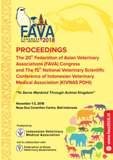MP-3 Antimicrobial Resistance of Streptococcus suis and Salmonella sp. Isolates from Selected Swine and Poultry Farms in Regions III and IV in the Philippines
Abstract
Swine and poultry industries are significant contributors to the agricultural sector in the Philippines. Specifically, the provinces in Regions III and IV have registered the highest number of pigs and chickens raised and also the highest production of pork, chicken and eggs in the Philippines. Despite the increasing trend in chicken and pork production, these agricultural sectors are beset with animal health concerns, particularly, the occurrences of bacterial diseases and indiscriminate use of antimicrobial compounds. The widespread practice of antimicrobial use provides an environment conducive for selection, spread and persistence of antimicrobial-resistant bacteria.
Antimicrobial resistance is being encountered in swine and poultry industry with the common respiratory and gastrointestinal diseases of bacterial causes. In this research, the commonly observed opportunistic agent, Streptococcus suis was detected in pigs, while the enteric bacteria, Salmonella enterica was isolated from chickens. Antimicrobials are important for the control of infectious diseases. However, several studies have shown that the use of antimicrobials has resulted in resistance, making AMR a worldwide concern.Downloads
Download data is not yet available.
Published
2018-10-28
Section
FAVA Microbiology & Parasitology

